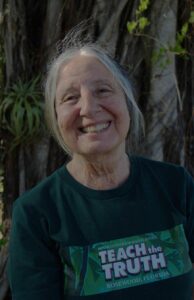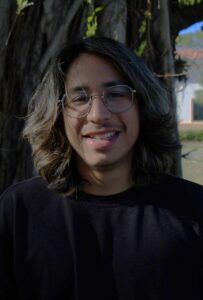A non-profit has been founded to continue the student paper’s storied history by facilitating its financial independence
By Florence Fahringer
Original Air Date: September 20, 2024
Host: The future of The Catalyst, the weekly student-run newspaper of New College of Florida, had been uncertain in the wake of a new, controversial administration and the retirement of its longtime faculty sponsor. But it also presented an opportunity to launch something new, or in the case of the name of its second iteration, something “old.” Florence Fahringer explains.
Florence Fahringer: New College of Florida’s student newspaper — the Catalyst — is just about as old as the college itself, as Maria Vesperi — the New College professor of thirty-odd years, who retired this past May — explains.
Maria Vesperi: The Catalyst started in 1965 as a student newspaper for New College. There are archival copies that are pretty interesting. And it ran through the 60s, and I think a little longer, and then faded away, as student-sponsored activities are likely to do.
And then, when I came to campus in Fall of 1993, I came straight from a newsroom in Washington. And, Some students approached me and asked me if I’d be willing to help them because they were interested in journalism, I said sure. So in the spring of 1994, we did a group tutorial called “Writing for a Public Audience.”

Maria Vesperi
And at the end of the semester, I invited them to my house in St. Pete — which I don’t usually do, because it’s kind of far away — but they came up there for spaghetti dinner, and at the end of the evening, they said to me, “We’ve been talking,” — I could tell I was getting cornered for something — “Would you be willing to Start another newspaper, ar start the Catalyst up again?” And I said, “Yes.”
FF: A key ingredient for a well-oiled student paper is the willingness of the college administration to talk to their own students. For most of the Catalyst’s history, that key ingredient was something which could be counted on.
MV: Everyone — from the president to the CFO to various heads of various departments and so on — thought of it as part of their job, to help the student reporters. So, we were never denied interviews. People in administrative roles, if they were too busy, they’d refer their reporter to someone else. But, until the administration changed, we never had a student denied an appointment with the president, or even put off for more than a few days.
And it kind of gradually and then more rapidly went — with a few exceptions there, a few administrators who always spoke to the reporters — but for the most part, it went from delayed responses to no response, or a request for questions that would then be responded to in writing. And I tried to explain to them, that’s not helpful, because part of the learning process is having an interview, asking follow-up questions, figuring out how to handle yourself in an interview. And you know, we didn’t have that anymore. The students found it very, very frustrating.
FF: Just over a year after the New College takeover, the staff of the Catalyst made the momentous decision to separate from the college, founding a non-profit organization to run the publication.
Independent student-run newspapers aren’t unheard of. The University of Florida has one, the Independent Alligator, which became independent half a century ago. The paper, though officially separate from UF, is run by UF’s journalism students. Shortly after UF’s own recently appointed career-Republican President Ben Sasse resigned this past July, the Independent Alligator broke the news of Sasse’s gross misuse of University funds.
Vesperi and Chief Editor Isaac Tellechea see the independence of the student newspaper as coming with some pros and cons.

Isaac Tellechea
Isaac Tellechea: While a pro is, definitely, with all of the changes that are happening at New College, is not having to be as careful about how administrators receive certain stories that we publish. Especially because our staff is made up of New College students. In the 23–24 semesters, we were experiencing some issues where staffers were worried for their own academic well-being, and their own status at the school, depending on what stories they chose to take on. And that is a huge plus, that we will no longer have to have students worrying about any sort of retaliation.
MV: Yeah, and there’ll be Alums working on it, too. Recent alums.
IT: Yes
MV: Our biggest protection has been what Isaac said: ethical, carefully researched journalism. We’ve never so far had a situation where we had to retract something because it was carelessly reported. And so, as long as we can keep doing that — and we’re going to have volunteer editors too — we’ll be able to move forward confidently with stories we know are important.
FF: So what should prospective readers of this future publication expect? One thing will be a name change. The old URL for the website will be retired, and a new name for the publication, “Old School Catalyst,” will be adopted. Tellechea elaborates.
IT: Well, Old School Catalyst will be fully digital once the website is built. And in terms of what we can expect … I hope that those that are familiar with the Catalyst as it was at New College will come to expect good, effective, ethical student journalism. Things that are focused on New College and what’s happening on campus. But also, we’re hoping to expand our scope. We want to touch on things that are affecting the greater Sarasota Community. And even outside of Sarasota, we want to talk about national issues, international issues — which we did when we were the Catalyst, but we want to put more of an emphasis on that, and we want to do more of that going forward, more in-depth national and international stories, because we know that there are passionate members on staff that care about big issues that affect more than just the Sarasota community.
FF: This is Florence Fahringer, reporting for WSLR News.
WSLR News aims to keep the local community informed with our 1/2 hour local news show, quarterly newspaper and social media feeds. The local news broadcast airs on Wednesdays and Fridays at 6pm.